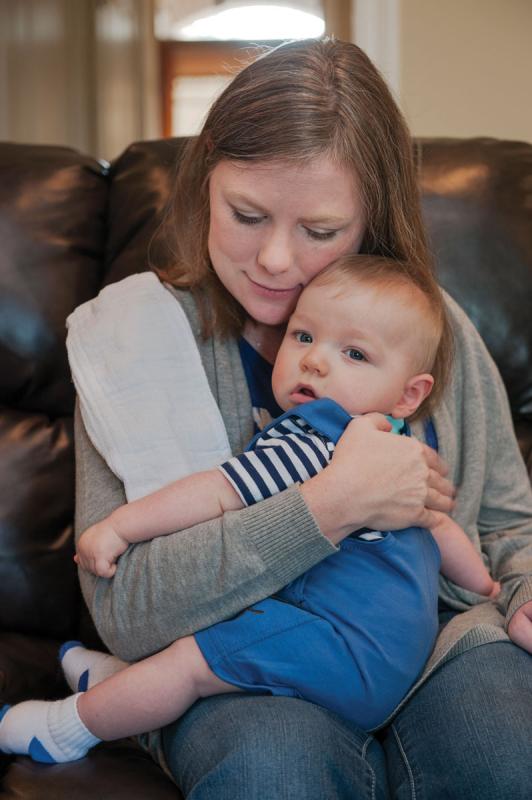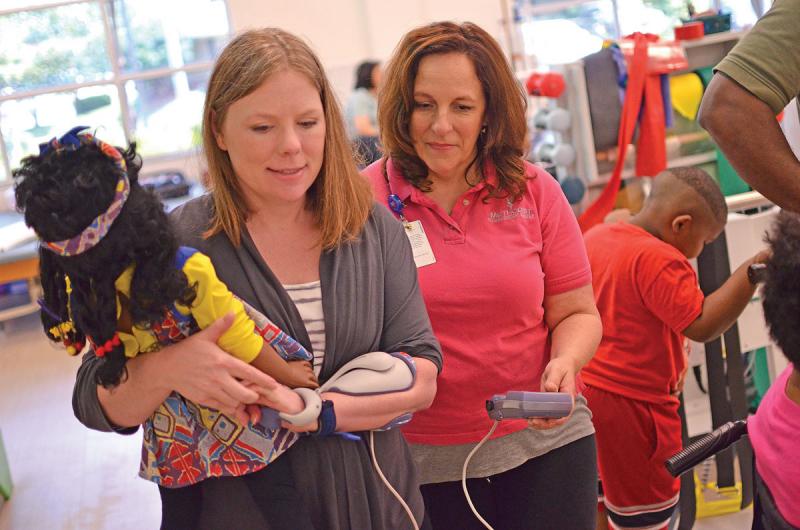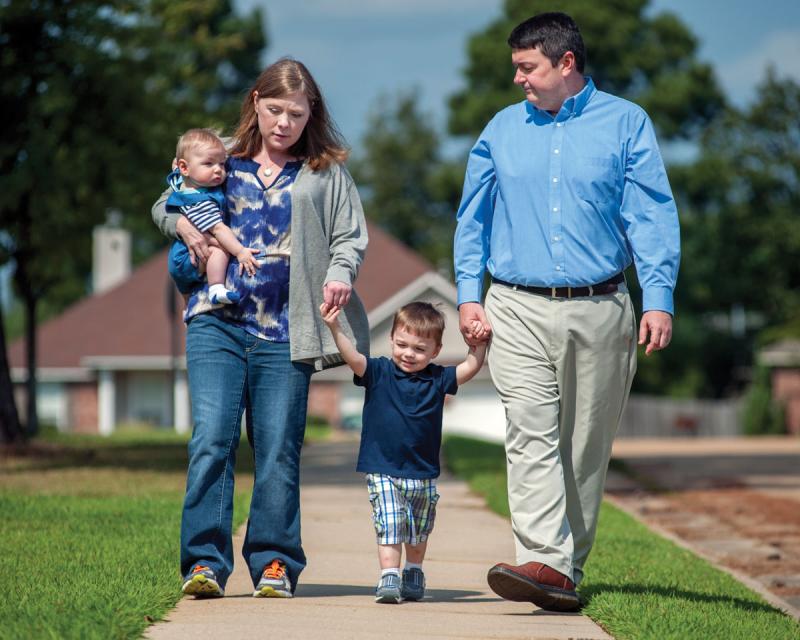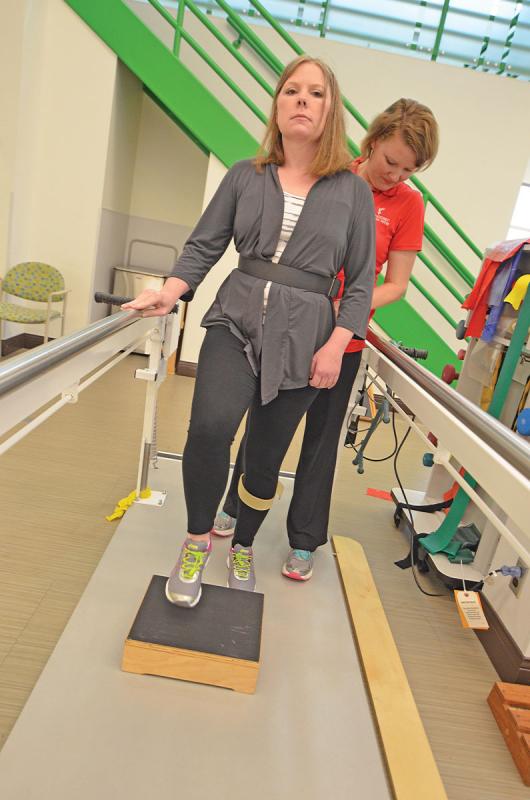Distracted by the demands of a new baby in the house, Cheri Hicks wasn’t expecting the worst when a “thunderclap headache” sent her to the hospital.
She’d had a C-section eight days before and suspected the pain was a side effect of spinal anesthesia.
But within 48 hours, a brain scan revealed a heartbreaking sight to her husband, Scott, a pharmacist at Walgreens in Brandon.
“There was a bleed in her right hemisphere,” Scott said. “It was about the size of a lemon, just a big black spot in the middle of the CT.”
A big black spot that was paralyzing Cheri’s left side, leaving the mother of two as helpless as her newborn.
“She walked into the hospital on her own power and within just minutes lost all ability on her left side,” Scott said. “It was that quick and that severe.”
Cheri’s stroke was related to a pregnancy complication called preeclampsia. The condition causes a dangerous rise in blood pressure that can be fatal.
Throughout her pregnancy, Cheri’s blood pressure had been a healthy 115/75. So when it leapt to 140/90 the day before her scheduled C-section, Cheri’s obstetrician decided not to take any chances. She delivered 9–pound, 3-ounce Spencer that day.
“Everything went great,” Cheri said. “The C-section was so easy. Spencer was born that Tuesday, Feb. 18 and we went home on Friday.”
Happily settled in with Scott, Spencer and 2-year-old Carson, Cheri hated to leave home when her headache started on Feb. 26. But she followed her doctor’s advice and went to the hospital for a CT scan.
When that first brain scan didn’t reveal any problems, Cheri said doctors “pumped me full of magnesium” and reduced her 190/110 blood pressure to a reasonable rate. And just to be safe, she stayed in the hospital overnight.
By the next day—Thursday, Feb. 27—Cheri felt better. And her doctor approved a discharge so Cheri could get back to her baby and toddler.
“They told me to monitor my blood pressure, which we did,” Cheri said. “And I woke up Friday morning and everything started all over again. I had a headache, then I started slurring words, and I couldn’t think straight. My last memory was walking through the hospital doors.”
As Cheri was being examined, a nurse asked her to smile. And Scott’s heart sank as he saw his wife flash a lop-sided grin.
“The moment she had one-sided weakness, I knew our lives would be changed forever,” he said. “My only question was: What kind of stroke was it?”
The CT image suggested a hemorrhagic stroke, the worst kind in Scott’s mind. Caused by bleeding rather than clotting, such strokes are particularly deadly.
“I knew the survival rate was 25 percent for the first 48 hours after a hemorrhagic stroke,” Scott said.
It was decided that Cheri needed a hospital better equipped to deal with her brain injury—only there wasn’t a neuro-ICU bed available in Jackson. “We waited about six or seven hours for a bed—that was the worst part,” Scott said.
“I was a sitting time bomb basically,” Cheri said. “Scott said I was becoming less and less responsive and I was stuck in a hospital that couldn’t help me. I have no memory of this, which is probably good.”
After being transferred, Cheri received medications to help control swelling in her brain. But on March 1, a portion of her cranium had to be removed to prevent the bruising that can occur when the brain expands against a hard skull.
“My next memory is waking up in ICU,” she said. “My head was full of staples, and I was learning how to brush my teeth again.”
Six days after surgery, Cheri transferred to Methodist Rehabilitation Center. “I was foggy,” she said. “And I was completely flaccid on my left side, I couldn’t stand or do anything.”
But she still attacked therapy “like a job,” realizing her family’s future rested on her ability to get better.
Cheri took her first steps on March 27 and had begun to move her arm the week before she left inpatient therapy. But such accomplishments didn’t make up for missing her boys, and Cheri admits: “I cried a lot.”
Dr. Alyson Jones, who leads MRC’s stroke program, said depression is common after stroke and even more understandable for postpartum stroke patients like Cheri.
“They often need a lot of counseling,” she said. So she involves MRC’s neuropsychology team early on.
“These moms know they need to get better, but they want to be home with their child,” Jones said. “They feel they are missing out on bonding moments.”
To help moms stay involved with their children, MRC staff encourages family visits. And even when Spencer wasn’t around, Cheri got in some baby-wrangling practice.
Her occupational and physical therapist incorporated a baby doll into therapy sessions, even adding some pounds to the stand-in infant to approximate Spencer’s hefty weight.
“She would practice putting a diaper on the doll and holding it,” said physical therapist Kathleen Dobbs.
One of Cheri’s goals was to progress to standing, but that didn’t seem likely at first. “She had no active movement in her left leg at all at admission,” Dobbs said. “But she progressed to standing and early walking.”
After leaving inpatient care, Cheri moved on to Methodist Outpatient Neurological Rehabilitation in Flowood. There, she continued to tackle one of the most frustrating side effects of her stroke, a condition called left side neglect.
“It’s when the injured side of the brain cuts off connectivity to the opposite side of the body,” explained brain injury physician Dr. Zoraya Parrilla, Cheri’s doctor while at MRC. “Your nerves are OK and your eyes are OK, but the brain might not acknowledge sensory or visual stimuli on one side.”
“Cheri didn’t even realize her left side was there,” said Methodist Rehab physical therapist Karen Klein. “She wasn’t walking consistently and was falling to the right because of the left neglect and the paralysis.”
“Plus, she was so impulsive that she wasn’t safe with mobility,” said Pat Baird, an occupational therapist at MRC. “A helmet was needed and required in therapy to ensure safety.”
The helmet was necessary because Cheri’s surgeon didn’t replace the missing bone in her skull until June 10. “Then I had to go through the whole staple thing again,” she said.
The Hicks say they were fortunate that Cheri’s mother, Judy Richardson, was able to move in with the family to help care for her grandsons. But Cheri was ready to reclaim some of her maternal duties by the time she finished therapy at Methodist Outpatient Neurological Rehabilitation.
“She was not caring for her boys at all and now she can pick up her 2-year-old and carry him,” Baird said.
“And I can get on the floor and play with him, and that is huge,” Cheri said. “He needs so much attention now mainly because I was gone for so long.”
Because of her limited hand function, Cheri still can’t change diapers or wrestle the kids into car seats. “But I can heat up bottles and feed Spencer,” she said. “And if he’s in his bouncer seat, I dance in front of him. He likes that.”
While many believe Cheri’s stroke came at the worst possible moment for her kids, she’s more pragmatic about the timing. “If it was going to happen, I’m glad it happened when they were so young,” she said. “I’d rather get my recovery out of the way when they won’t remember any of it.”
Cheri is working toward her latest goals at Quest, an MRC outpatient program that helps brain and spinal injury patients make a successful return to work, school and community life.
Through MRC’s driving rehabilitation program, she hopes to regain the skills to chauffeur her sons around safely. “Once we get to that point, regardless of whether her arm comes back completely, that will give her a new sense of freedom,” predicts Scott.
Cheri says she already feels emboldened by all she has been through. “Anything that I thought was scary before—nothing is as scary as this,” she said.
These days, she’s experimenting with blogging and has plans to pursue a degree in speech therapy. And those who have watched her prevail over her injuries have no doubt she’ll succeed.
“She has always been pretty spirited,” Scott said. “But when she was inpatient at MRC, her eagerness to fight and get home and be part of our family again was just inspiring.”
For more information about Methodist Rehab’s stroke recovery program, call 601-364-3436.




